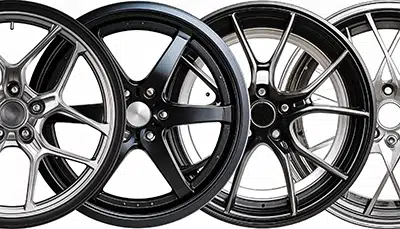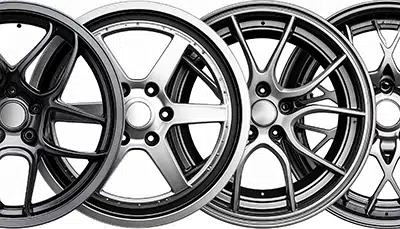Elevate Your Vehicle with Custom Wheels
Custom wheels are more than just an aesthetic upgrade—they're a comprehensive enhancement to your vehicle's performance, handling, and overall driving experience. At Custom Wheels N Tires, we offer an extensive selection of premium custom wheels designed to transform both the look and feel of your ride.
Types of Custom Wheels
We carry a diverse range of wheel types to suit every preference, vehicle, and driving style:
- Alloy Wheels: Lightweight aluminum alloy wheels that improve handling, acceleration, and fuel efficiency while providing excellent heat dissipation for better brake performance.
- Forged Wheels: Premium wheels manufactured through an advanced forging process, offering superior strength-to-weight ratio for high-performance applications.
- Steel Wheels: Durable and economical options that provide reliable performance in various conditions, particularly popular for winter use.
- Multi-Piece Wheels: Custom-built wheels featuring separate components (center, inner barrel, outer lip) that allow for unique widths, offsets, and aesthetic combinations.
- Flow-Formed Wheels: A hybrid manufacturing process that creates wheels with strength approaching forged wheels at a more accessible price point.
Materials & Construction
The material and construction method of your custom wheels significantly impact performance, durability, and price:
- Aluminum Alloy: The most common material for custom wheels, offering an excellent balance of weight reduction, strength, and affordability.
- Magnesium Alloy: Ultra-lightweight material used in racing applications, providing maximum weight savings but at a premium cost.
- Carbon Fiber: Cutting-edge composite wheels that offer extraordinary weight reduction and distinctive aesthetics for high-end vehicles.
- Steel: Traditional material known for its durability and lower cost, though heavier than alloy alternatives.

Performance Benefits of Custom Wheels
Upgrading to quality custom wheels delivers multiple performance advantages:
- Weight Reduction: Lighter wheels reduce unsprung weight, improving acceleration, braking, and handling responsiveness.
- Enhanced Brake Cooling: Many custom wheel designs improve airflow to brake components, reducing heat buildup and preventing brake fade during intensive driving.
- Improved Traction: Wider wheels allow for wider tires, increasing the contact patch with the road for better grip and control.
- Reduced Rotating Mass: Less weight at the wheels means your engine doesn't have to work as hard to accelerate, potentially improving fuel economy.
Choosing the Right Fitment
Proper wheel fitment is crucial for both performance and safety. When selecting custom wheels, consider these key specifications:
- Diameter: Measured in inches, this determines the overall size of your wheel.
- Width: The distance between the inner and outer edges of the wheel.
- Bolt Pattern: The number and spacing of lug holes must match your vehicle's specifications.
- Offset: The distance between the wheel's mounting surface and centerline, affecting how the wheel sits in the wheel well.
- Backspacing: The measurement from the mounting surface to the back edge of the wheel.
- Hub Bore: The center hole diameter that centers the wheel on the vehicle's hub.
Our wheel experts can help you navigate these specifications to ensure perfect fitment for your specific vehicle make and model.
Popular Finishes & Styles
Express your unique style with our wide range of finishes and design options:
- Chrome: Classic, high-shine finish that makes a bold statement.
- Machined: Combines a polished face with painted accents for a distinctive two-tone look.
- Matte Black: Contemporary, stealthy appearance that minimizes visual maintenance.
- Hyper Silver: Bright metallic finish that complements most vehicle colors.
- Bronze/Gold: Stand-out finishes that create a unique, premium aesthetic.
- Powder-Coated: Durable, customizable finishes available in virtually any color.
Key Takeaways
- Custom wheels provide both aesthetic enhancement and tangible performance benefits.
- Proper wheel fitment is essential for safety, performance, and vehicle protection.
- Material choice affects weight, strength, durability, and price point.
- Lighter wheels improve acceleration, braking, and handling responsiveness.
- Professional installation ensures optimal performance and prevents potential issues.

Frequently Asked Questions
How do I determine the right size custom wheels for my vehicle?
The right size depends on your vehicle's specifications, including bolt pattern, offset, and diameter. Our experts can help you identify the perfect fit based on your vehicle's year, make, and model, ensuring both proper fitment and your desired aesthetic.
Will custom wheels affect my vehicle's performance?
Yes, custom wheels can significantly impact performance. Lighter wheels reduce unsprung weight, improving acceleration, braking, and handling. Wider wheels can accommodate larger tires for increased traction. However, extremely large wheels may negatively affect ride comfort and fuel efficiency.
What's the difference between cast and forged wheels?
Cast wheels are made by pouring molten metal into a mold, creating a cost-effective but typically heavier wheel. Forged wheels are manufactured by compressing and shaping solid metal under extreme pressure, resulting in a stronger, lighter wheel with superior structural integrity, though at a higher price point.
Do I need special tires for custom wheels?
If you maintain the same overall diameter as your factory setup, your current tires may fit. However, if you change the wheel width or diameter, you'll likely need new tires with appropriate specifications. Our team can recommend tire options that complement your new custom wheels perfectly.
How do I maintain my custom wheels?
Regular cleaning with mild soap and water prevents brake dust and road grime buildup. Avoid harsh chemicals that can damage finishes. Apply wheel sealant or wax every few months for protection. Inspect regularly for damage and ensure proper torque on lug nuts during seasonal tire changes.